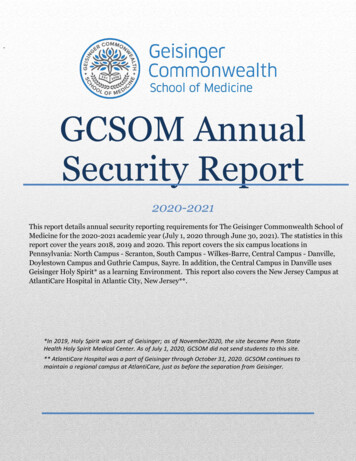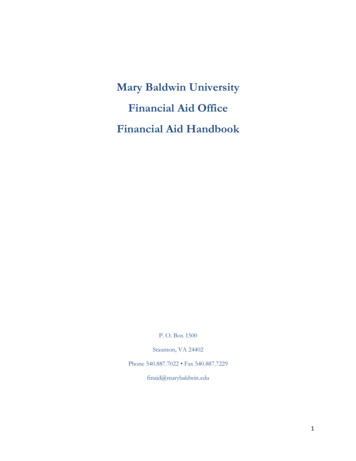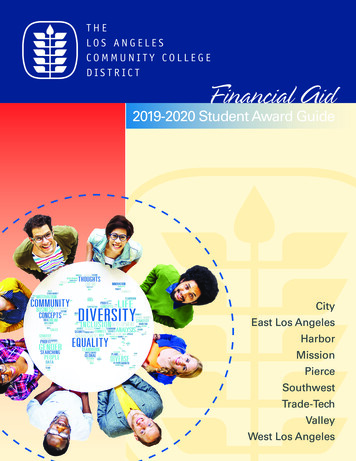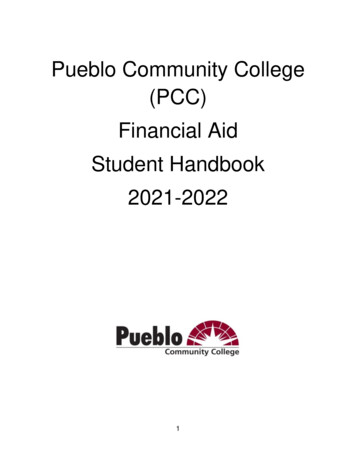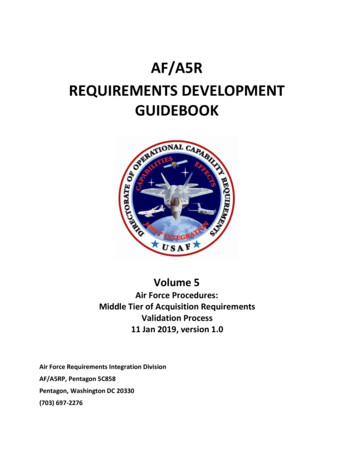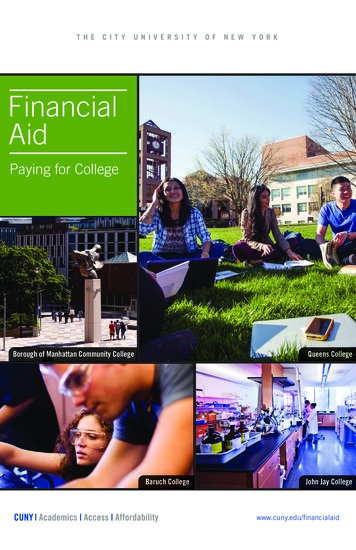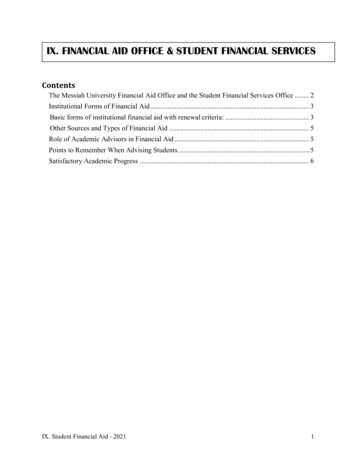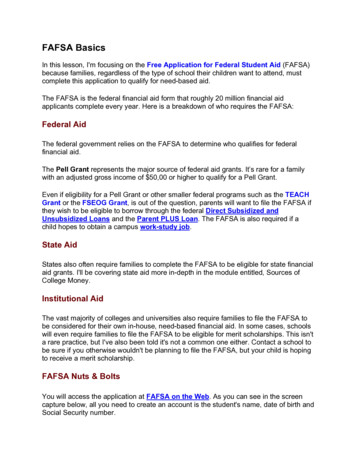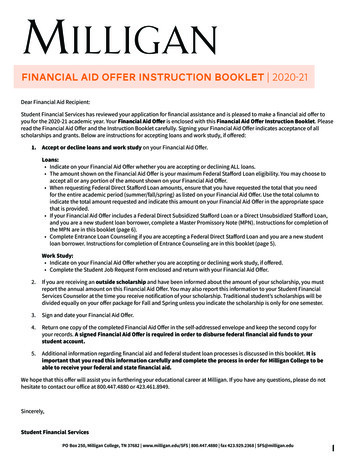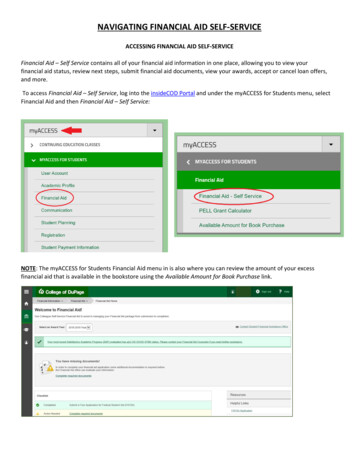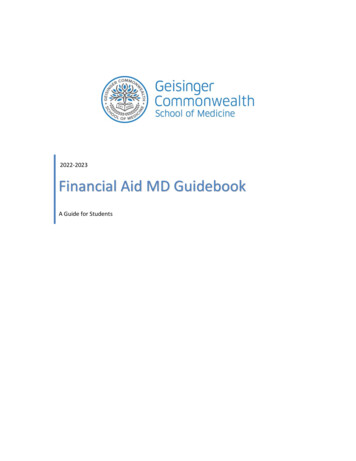
Transcription
2022-2023Financial Aid MD GuidebookA Guide for Students
Financial Aid Contact InformationThe Financial Aid Office is located on the First Floor of the Medical Sciences Building, 525 Pine Street, Scranton, PA18509. Office hours are 8 a.m. to 4:30 p.m., Monday through Friday, except for school holidays.Sue McNamara, Director of Financial Aid: phone (570) 504-9682 or email smcnamara@som.geisinger.edu.Roxanne Seymour, Associate Director of Financial Aid: phone (570) 504-7303 or email rseymour@som.geisinger.edu.Janice Richardson, Financial Aid Advisor: phone (570) 504-9611 or e mail jrichardson@som.geisinger.edu.In addition, you may contact the financial aid office by phone at 570-504-964 or by group email atfinancialaid@som.geisinger.edu.The purpose of this guidebook is to summarize general Geisinger Commonwealth School of Medicine (GCSOM) policiesand procedures related to financial aid, billing, and payment policies, and hopefully make your experience with financialtransactions at GCSOM a positive one. All Geisinger Commonwealth students are encouraged to review this guide andkeep it for their reference. While we know this guidebook contains a great deal of information, it is important that youtake the time to understand your financing options and your financial situation. Given the expenses you face, mistakescan be costly. If you encounter questions that are not covered or are insufficiently explained here, we encourage you todiscuss them with a member of the Financial Aid Office by telephone, email or in person. We wish to assist you in resolvingany problems in meeting your expenses as early as possible, freeing you to concentrate on your academic pursuits fromthe first day of classes to your graduation.The content of this guidebook is provided for the information of the student and is not intended to be a legal document.It is accurate at the time of printing but is subject to change from time to time as deemed appropriate by the school tofulfill its role and mission to accommodate circumstances beyond its control. Any such changes may be implementedwithout prior notice and without obligation, and unless specified otherwise, are effective when made.Whenever possible, the most current financial aid information will appear on our Website and Portal for the various topicson Financial Aid.1. FINANCIAL AID AT GEISINGER COMMONWEALTH SCHOOL OF MEDICINEIntroductionThe Financial Aid office stands ready to assist students to identify sources to supplement their personal and family’sresources to pay for their legitimate educational expenses and to provide any other services needed that are related tothe financing of their educational investment.Geisinger Commonwealth School of Medicine Financial Aid Guidebook for 2022-2023Page 2
The Financial Aid office also exists to provide students with the basics of financial literacy, fiscal planning/budgeting anddebt management to prepare students to manage their loan borrowing and make informed decisions about all aspects oftheir financial well-being during their school years and beyond. It is extremely important for students to understand theimportance of taking charge of their finances from the beginning of their medical school years. This will avoid last minutefinancial stress at the beginning of the academic year and the financial planning lessons learned will hopefully translate togood financial habits for life.Mandatory financial aid information sessions will take place for all federal loan borrowers in the fall semester of year onewith a member of our financial aid team, in addition to federal entrance counseling sessions provided atwww.studentaid.gov. Topics for these sessions may include explanation of specific financial aid resources, general financialassistance, financial literacy and debt-management counseling and loan counseling.Financial aid personnel are available to assist students during normal business hours in person, by phone via email,Microsoft TEAMS, or Zoom sessions. The Financial Aid website contains complete details about financial aid programs aswell as policies and procedures including links to other scholarship resources both internal and externally.GCSOM subscribes to the philosophy that students, with the help of their families, have the primary responsibility forfinancing their education to the best of their ability. Once it is determined that a student and his/her family have madeevery reasonable effort to finance as large a portion of the student’s educational expenses as possible, the Financial AidOffice will seek to develop, with the student, a plan whereby his/her education may be continued through a combinationof loan(s) and/or institutional assistance. The Financial Aid Office can also assist with budgeting, estimation of educationalexpenses, loan counseling and debt management for all students.The tuition at GCSOM is set at a very affordable rate in comparison to other private medical schools. GeisingerCommonwealth also provides institutional resources based on financial need and/or merit. Need is determined by ananalysis of the information that is provided by the student, spouse, and parents on the Free Application for Federal StudentAid (FAFSA.) called an EFC or Expected Family Contribution.Accreditation StatusGeisinger Commonwealth School of Medicine received full accreditation by both the Liaison Committee for MedicalEducation (LCME) and the Middle States Commission on Higher Education in spring 2019.Student Enrollment StatusStudents in the MD Program are expected to be full-time students who take all the courses required annually for eachcurriculum. Any change in enrollment status must be immediately reported to the Financial Aid Office. Changes inenrollment status may affect financial aid awards. If a student is permitted to enroll for less than the required courses,financial aid awards may be adjusted. In such cases, the enrollment status used for financial aid purposes will be the sameenrollment status as defined by the Registrar.Geisinger Commonwealth School of Medicine Financial Aid Guidebook for 2022-2023Page 3
Notice of Nondiscrimination PolicyGeisinger Commonwealth, in accordance with local, state and federal law is committed to providing equal educationaland employment opportunities for all persons, without regard to sex, race, color, religion, creed, national origin, ancestry,age, physical handicap, disability, marital status, veteran’s status or any non-job-related factors. Respect for the dignityand worth of everyone is a basic tenet of GCSOM, and, as such, the school is committed to providing an environment freeof discrimination. Geisinger Commonwealth is an equal opportunity employer EOE.Any inquiries may be directed to the Vice President of Community Engagement and Chief Diversity Officer by calling(570) 504-7000.Commitment to DiversityGeisinger Commonwealth is committed to the enrollment of a diverse body of talented students and to strengthening theparticipation of minorities, women, and individuals from all cultural and economic backgrounds. A diversity of experiencesand interests is desirable and serves to enhance the education of the physician who will serve the community and thegreater public.2. STUDENT ELIGIBILITY, RIGHTS & RESPONSIBILITIESGeneral Eligibility RequirementsEach source of financial assistance has different application and eligibility criteria, based primarily on the amount of fundsavailable. The initial requirements for the receipt of GCSOM funds are the same as the requirements for receiving U.S.Department of Education Federal Financial Assistance that are listed below. The following general requirements apply toall sources of financial aid. To receive financial aid, you must: Be a U.S. citizen or have a Permanent Resident Visa.Be accepted for admission or enrolled at least half-time.Be in good academic standing and be making satisfactory academic progress toward a degree.For need-based financial aid, students must have financial need, which is defined as the difference between theschool budget (COA) and the Expected Family Contribution (EFC). The definition of the Expected FamilyContribution differs depending on the source of aid. All students must promptly notify the Financial Aid Office inwriting of any change in their financial circumstances during the year. Failure to report changes such as maritalstatus, parental income, assets, scholarship aid, work income for student or spouse, etc., could result in totalloss of assistance and/or revision of past awards. At times there may be institutional merit scholarships that maynot require financial need.Not be in default on any loan made under Title IV at any institution.Have a valid Social Security Number with the Social Security Administration, if required.Some federal, state or GCSOM assistance programs may have different eligibility criteria.Geisinger Commonwealth School of Medicine Financial Aid Guidebook for 2022-2023Page 4
Student RightsAS A STUDENT AT GCSOM, YOU HAVE THE RIGHT TO KNOW: The cost of attendance. The refund policy for students who withdraw. The types of financial assistance available from federal, state, and institutional sources. Procedures and deadlines for submitting applications for financial aid. How financial aid recipients are selected. How your financial aid eligibility was determined, including all resources the Financial Aid Office consideredavailable to you. What portion of your financial aid is a loan and must be repaid and what portion is a non-repayablegrant/scholarship. In what manner and when funds will be disbursed to you. The explanation/description of each type of award you receive. For any student loan you receive: the interest rate, the total amount you must repay, the repayment scheduleand the length of the repayment period, the cancellation or deferment provisions for your loan(s). Criteria used to determine “satisfactory academic progress” for financial aid purposes. How to appeal a decision by the Financial Aid Office concerning your aid award. That the information you give to the Financial Aid Office will be treated confidentially and that you have theright to view contents in your financial aid file, in accordance with the Family Educational Rights and Privacy Act. You have the right to certain consumer information (See Chapter 9).Geisinger Commonwealth School of Medicine Financial Aid Guidebook for 2022-2023Page 5
Student ResponsibilitiesAS A STUDENT AT GCSOM, IT IS YOUR RESPONSIBILITY TO: Read directions thoroughly, complete all applications accurately and comply with all deadlines. Provide all supplemental information or documentation required by the Financial Aid Office or other agency, ifapplicable. Provide correct information. Read, understand, and retain copies of all forms you are required to sign. Know and comply with the rules governing the aid you receive. Know and comply with all requirements for continuation of your student aid, including the requirement forsatisfactory academic progress. Live within your budget. Honor all agreements that you sign. Repay all student loans according to your established payment schedule. Apply for loan deferment or forbearance while in school, if eligible. Report any change of address and/or change in enrollment status to your lender(s). Notify the Financial Aid Office of any change in your enrollment status or financial status. Notify the Financial Aid Office of all resources not listed on your award letter, including any scholarships, grantsor loans received from outside sources. Use aid funds solely for direct educational costs and related living expenses. Complete an entrance interview and an exit interview if you receive federal loans while in attendance atGCSOM. (www.studentaid.gov ).Geisinger Commonwealth School of Medicine Financial Aid Guidebook for 2022-2023Page 6
Students with Prior Educational LoansAll students are encouraged to keep accurate records of their educational loans. Students can review their federal loanhistory at www.studentaid.gov. An FSA ID number is needed to access this information. Note that any alternative or privateloans will not be listed in this database. It is especially important to keep your creditors informed of your current mailingaddress. Students who maintain good records, including signed copies of promissory notes, will be in a stronger positionto resolve difficulties than students who are inattentive in this area.Students who received Federal Title IV loans prior to attending GCSOM are eligible to receive the usual educational InSchool Deferment on their federal loans. Payment options for private or alternative loans depend on the loan lender orservicer. Forbearance is at the discretion of the lender. Students should contact the Financial Aid Office for moreinformation regarding options for postponing payments for Federal Title IV Loans.Repaying Educational LoansDebts have long-term implications for your financial future; therefore, you should pay special attention to themanagement of your educational debts. The Financial Aid office provides loan entrance counseling to all new students.This counseling highlights the consequences of borrowing and the obligations associated with student loans. Assistance isalso given to students in maintaining good loan records.Loan exit counseling information is provided to all graduating students during the spring before graduation. In addition,the financial aid office conducts personalized individual one-on-one debt-management/loan repayment sessions for allgraduating students. At this session, borrowers are provided with a comprehensive summary of their educational loansincluding their loan portfolio from NSLDS (National Student Loan Database) with the total amount of federal loan debt todate, information about loan options, repayment strategies and debt management information to assist them with futureplanning and repayment. The financial aid office customizes these sessions so that students know exactly who their loanservicer is, how to contact them and what the next steps are as they prepare to graduate.Debt may be difficult to manage on what a borrower can expect to earn as a resident physician. If meeting scheduled loanpayments creates a hardship at this point, there are a variety of repayment options a loan servicer can offer. These includethe economic hardship deferment, forbearances, loan consolidation, income-based repayment or restructuring ofpayment plans. Borrowers should contact their lender or servicer as necessary to discuss options for establishing anacceptable payment schedule to avoid being classified as in default.Several agencies offer loan repayment plans that assist in repaying medical school loans in exchange for a commitment topractice in a designated area for a specific time. Examples are the National Health Service Corps and various branches ofthe military. Further information about these options is available through the Financial Aid office and the financial aidportion of the college website.The Association of American Medical Colleges (AAMC) website also has extensive information about debt managementand financial planning. https://www.aamc.org/services/fao-first/.In addition, Geisinger Commonwealth School of Medicine has successfully launched in the spring of 2018 a servicecommitment program of its own called the Abigail Geisinger Scholar Program. The birth of this program was two-fold:Geisinger Commonwealth School of Medicine Financial Aid Guidebook for 2022-2023Page 7
1. To assist with student debt2. Help repopulate the physician shortage in northeast and north Central Pennsylvania.Currently this program accepts forty-five new recipients each year with criteria based on a rubric that includes merit,financial need, and intent to return to the area to practice. A multi-disciplined selection committee reviews students’application.The specialties for this program are family medicine, internal medicine, medicine-pediatrics and psychiatry. Click here tolearn more about the Abigail Geisinger Scholar Program ancialaid/scholars-programNew for the 2022-2023 academic year, four of the forty-five students selected will be a part of an accelerated pathwayfor students pursuing a career in primary care called the Abigail 3 3 Program. Like its name, this program will allowparticipants to complete their core requirements and enter a Geisinger primary care residency after three years of study.The program will contain additional curriculum requirements that will enhance their preparation in either internal or familymedicine.3. TYPES OF FINANCIAL AIDFinancial aid is any grant, scholarship or loan, offered for the sole purpose of meeting educational expenses. The Cost ofAttendance budget summarizes the total educational expenses for an academic year. Financial aid is usually provided byor through federal and state agencies, GCSOM, foundations, corporations, and other private sources.Loans – Loans are funds that must be repaid, normally after leaving school or completing residency. They come in manyshapes and sizes, with very different interest rates, repayment benefits and terms, and eligibility or servicerequirements.Scholarships/Grants -Scholarships and grants are generally regarded as gift assistance and need not be repaid, althoughthey may carry certain provisions and obligations.There are three basic sources of financial aid at GCSOM: (1) federal government resources (Unsubsidized and GraduatePlus loan); (2) GCSOM Institutional Funds and (3) outside agencies, organizations, lenders, and donors. In addition,Geisinger Commonwealth School of Medicine service commitment program called The Abigail Geisinger ScholarsProgram. This program allows students in each new incoming MD class, the ability to apply for this commitmentprogram which is based on merit, need and likelihood to return to the area to practice after residency. To learn moreabout the Geisinger Scholar Program, you can visit our website inancial-aid/scholars-programfor general information, how to applyand frequently asked questions.Federal Loan ProgramsFederal student loans are supported by the federal government and these loans usually have low interest rates and offerattractive repayment terms, benefits, and options. In some cases, students may be able to finance all their educationalexpenses through federal loan programs.Federal loan types for professional students include the Federal Direct Unsubsidized Loan and Federal Direct GraduatePLUS Loan. The first step to apply for these loans is to complete the Free Application for Federal Student AidGeisinger Commonwealth School of Medicine Financial Aid Guidebook for 2022-2023Page 8
(FAFSA) at www.studentaid.gov. The FAFSA must be completed annually. Additional requirements for the loans includethe completion of a Master Promissory Note (MPN) and Entrance Counseling located at www.studentaid.gov .Family LoansStudents are encouraged to discuss the possibility of a parental contribution to their educational expenses. While acontribution from parents is usually thought of as a gift, some students and parents might feel more comfortable inregarding this contribution as a long-term loan with little or no interest involved. Students (or their spouses or parents)who are homeowners, and who have considerable equity in their homes, may wish to consider a home equity loan as asource of funding their medical education. Please keep in mind that a home equity loan will increase your payment duringthe time you are in school.Geisinger Commonwealth School of Medicine Institutional AidGeisinger Commonwealth School of Medicine scholarships and awards Our institutionally funded scholarships and awards are available to admitted students.Eligibility factors include academic achievement, merit, diversity, interview day scores and socio-economicbackground (primarily AMCAS data). A holistic awarding approach is taken, considering many factors.The Office of Admissions is responsible for choosing and notifying recipients rather than the Office of Financial Aid.Award amounts vary for each student but generally range from 10,000 - 60,000 per year.Scholarships and awards are typically renewable for up to four years if making satisfactory academic progress.If offered a scholarship or award, you will be provided with important “Terms & Conditions of Your Scholarship Offer.GCSOM Endowed ScholarshipsThe requirements for these scholarships will be written when funds are approved for these scholarships. These arescholarships established by outside donors who may place specific requirements that must be met by recipients. Thesemay be need-based or academic / merit-based scholarships depending on the donor’s restrictions. Please see the financialaid portion of the website for more information on endowed scholarships.Outside Scholarships/GrantsThere are a variety of outside sources of funding available to graduate and medical students. Some scholarships are easilyobtained, while others are more competitive. Researching and applying for scholarships can be time consuming but is wellworth the effort. The more scholarships/grants students receive, the less they would need to borrow. Appendix C providessome sources of outside scholarships. You may want to ask if your parents’ employers have any scholarship or low-interestloan programs for children of employees. There may also be scholarship opportunities provided by some religious andfraternal organizations, as well as local service clubs (e.g., Rotary, Lions Club, etc.), if you or your parents/spouse aremembers. Some county medical societies also provide scholarship assistance to medical students.GCSOM maintains a list of private external scholarships on the college’s website in the Financial Aid s-awardsGeisinger Commonwealth School of Medicine Financial Aid Guidebook for 2022-2023Page 9
APPLYING FOR FINANCIAL AIDApplication ProcessAll students interested in receiving federal Title IV funding at GCSOM must complete the FAFSA.All Abigail Geisinger Scholar recipients must also have a FAFSA on file as well.1) FAFSA: Free Application for Federal Student Aid should be filed at www.studentaid.gov.To be considered for institutional funding, the FAFSA must be filed no later than March 1 and include parental orspouse financial information. Financial aid is awarded on a yearly basis and renewal is not automatic. Students mustreapply by March 1 each year to determine eligibility for all financial aid resources. If a student is only interested infederal loans to assist with their medical school education, the FAFSA must be completed for the academic year forwhich the student is applying and would not need to include parent financial information.Free Application for Federal Student Aid (FAFSA )This form is used to calculate your Expected Family Contribution (EFC) and to provide demographic and financialinformation. To file the FAFSA, you must have your FSA ID number from the U.S. Department of Education. If you do nothave an FSA ID, you can request one at https://fsaid.ed.gov . Be sure to read all instructions and complete the entire form;do not leave any items blank that pertain to you. Incomplete forms will be rejected by the Central Processor, and you willbe required to make all corrections before the FAFSA information will be complete for use by GCSOM.To be considered for institutional aid both the parent and student sections must be completed each year. Please note thatthe parents are not required to sign the FAFSA for independent students. When asked “are you a health care professionsstudent” you must answer “YES.” Electronic FAFSA applications may be filed beginning on October 1 of each year.Processing of the FAFSA for GCSOMWhen completing the FAFSA, use federal school code G41672 to ensure that GCSOM receives the results of your FAFSA.Within a week after filing your FAFSA online, you will be able to view and print your Student Aid Report (SAR) whichsummarizes your financial situation.As a student at a professional school, you are considered an independent student and you must submit financialinformation about yourself and your spouse on the FAFSA to be considered for Federal Financial Assistance. For financialassistance from GCSOM-administered funds, you are required to submit parental information as well.To be considered for institutional-administered financial aid, it is extremely important that a FAFSA is fully completedas soon as possible after acceptance and no later than March 1. Ideally, students should complete their FAFSA as earlyas possible after October 1 of each year. Late filers or an incomplete FAFSA will delay the processing and could result inineligibility for college-administered financial assistance. THE FINANCIAL AID TIMELINE ON THE NEXT PAGE LISTS THE DUEDATES FOR FILING THE FAFSA FOR CONSIDERATION OF GCSOM FUNDS.You are not required to file a FAFSA if you do not wish to be considered for any School-administered financial assistanceor federal loans.Geisinger Commonwealth School of Medicine Financial Aid Guidebook for 2022-2023Page 10
Verification Policy and ProceduresStudents whose records are selected will be sent a notification by the Financial Aid Office requesting the requireddocumentation. Requested information must be submitted to the Financial Aid Office within 6 weeks of notification.Until all information is provided, institutional and federal aid cannot be finalized. If requested documentation is notavailable at the time the student receives the notification, an extension can be granted by the financial aid office if arequest for the extension is made in writing to the financial aid office. The request for extension must include thereason the documentation is not being provided and an estimated date that the documentation will be available.Verification DocumentationAlthough GCSOM may not be required to collect copies of tax returns and other financial records for Federal Departmentof Education Verification purposes, GCSOM reserves the right to request copies of these items in the event it feels itnecessary to verify information submitted by student and/or spouse and/or parents in the financial aid applicationprocess. In the event such information is requested and it is not supplied to GCSOM, the applicant may be denied financialaid that is administered by the College.Documents for verification include: A completed Verification form (available from the Financial Aid Office) A signed copy of the student’s (and spouse’s if married) 2019 Federal Tax Transcript. If a copy was not retained,contact the IRS at www.irs.gov to request a transcript. Non-tax filers must complete all questions in section 3and/or section 4 of the Verification form and attach any W-2 forms. Any other verification information requested by the Financial Aid Office such as household size, marital status,etc.Review of Verification InformationAfter all required verification information is submitted by the applicant, the Financial Aid Office will verify applicationdata by comparing it to the requested documents. Financial Aid will be processed and/or finalized if all information isaccurate or within federally approved tolerances. If corrections are required, the Financial Aid Office will correct thedata and process the financial aid.Notification of Verification ResultsNotification of the applicant’s award eligibility and/or certification of federal loans will indicate the student’s eligibilityfor federal and/or college funds. If aid was previously awarded, the student will be notified only if verification results inprogram eligibility changes.Financial Aid TimelineThis timeline is intended to help students meet their financial aid obligations in a timely manner.October-February: October 1: First day to file Free Application for Federal Student Aid (FAFSA) for the next academic year. New MD students should file the FAFSA by March 1 to be considered for institutional aid. Please keep in mind that youshould be using prior prior year federal tax information when filing the FAFSA.January 2: Never too early to begin researching outside scholarship opportunities for medical school.Geisinger Commonwealth School of Medicine Financial Aid Guidebook for 2022-2023Page 11
MARCH: March 1: All MD students should have their FAFSA filed for the next academic year to be considered forinstitutional funding.APRIL Early April: Financial Aid Award letters mailed to new students.Late April: Make an appointment with the Financial Aid Office or call the Financial Aid Office if you still havequestions about your financing plan for the upcoming academic year.JUNE: Early June: Student Invoices for MD3s and MD4s sent 30 days prior to the start of the semesterLate June: New students should have their federal loan requirements completeJULY: Students should review GCSOM Refund Policy and be familiar with refund dates in the event of withdrawal. Fall invoices are sent to students 30 days prior to the start of the fall semester/quarter.AUGUST– SEPTEMBER: Mandatory Individual appointments with Financial Aid Office for all first-year medical student loanborrowers.OCTOBER: Students should review their financial plan and current budgeting and discuss with Financial Aid Office if itappears that a budget adjustment is needed.NOVEMBER: November is a good time to contact the Financial Aid Office if you have any questions about your finances insteadof waiting until the mid-term break.DECEMBER: December: Spring invoices are sent 30 days prior to the start of the spring semester for all enrolledstudents.Changes to this timeline or changes to due dates will be posted on the GCSOM Portal.5.DETERMINING FINANCIAL NEEDCalculated Financial NeedGCSOM uses
Financial Aid Contact Information The Financial Aid Office is located on the First Floor of the Medical Sciences Building, 525 Pine Street, Scranton, PA 18509. Office hours are 8 a.m. to 4:30 p.m., Monday through Friday, except for school holidays. Sue McNamara, Director of Financial Aid: phone (570) 504-9682 or email smcnamara@som.geisinger.edu.
